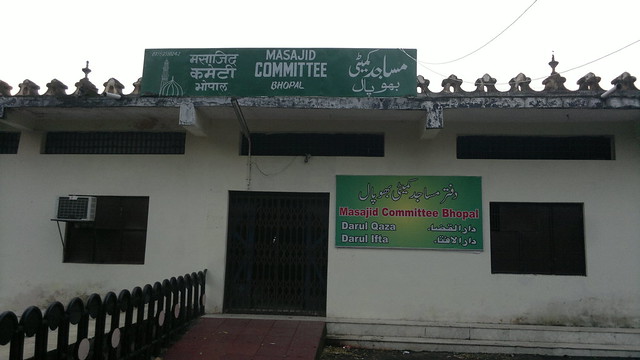By Pervez Bari, TwoCircles.net,
Bhopal: A bench of three Judges of the Supreme Court of India in a case has overruled the restraint put in by the Madhya Pradesh High Court on the issuance of “Fatwa” by the Dar-ul-Qaza and Dar-ul-Ifta functioning under the administration of the Masajid Committee, Bhopal.
The Supreme Court in an earlier recent judgement in the case of Vishwa Lochan Madan held: “In our opinion, one may not object to issuance of “Fatwa” on a religious issue or any other issue so long as it does not infringe upon the rights of individuals guaranteed under the law. “Fatwa” may be issued in respect of issues concerning the community at large…”.

Office building of the Masajid Committee, Bhopal wherein the Shariah courts of Dar-ul-Qaza & Dar-ul-Ifta are situated.
The Supreme Court observed that the legality and correctness of the impugned order of two-member bench of the M.P. High Court in the case of Mohammad Zahir Khan Koti versus Masajid Committee, Bhopal & Others is not required to be gone into detail in view of the pronouncement of the decision of the Supreme Court in Vishwa Lochan Madan Vs. Union of India and Others.
The Supreme Court said the judgement of the Madhya Pradesh High Court shall be treated as substituted by the above law laid down by it.
The case in the Supreme Court was heard by three-member bench comprising of the then Chief Justice M. Lodha, Justice Kurian Joseph and Justice Rohinton Fali Nariman. For the Masajid Committee, Bhopal the case was pleaded by Supreme Court lawyer Syed Shakil Ahmad and assisted by Syed Danish Ahmad, Mohammad Pervez Dabas & Uzmi Jameel Husain advocates.
The Supreme Court in its judgement said that the object of establishment of such a court as Dar-ul-Qaza and Dar-ul-Ifta is laudable but there is no doubt that it has no legal status.
“A “Fatwa” is an opinion, only an expert is expected to give. It is not a decree, nor binding on the court or the State or the individual. It is not sanctioned under our constitutional scheme. But this does not mean that existence of Dar-ul-Qaza or for that matter practice of issuing “Fatwas” are themselves illegal”, the SC clarified.
The judgement said that it is informal justice delivery system with an objective of bringing about amicable settlement between the parties. It is within the discretion of the persons concerned either to accept, ignore, or reject it. However, as the “Fatwa” gets strength from the religion; it causes serious psychological impact on the person intending not to abide by that.
It may be recalled here that one Mohammad Zahir Khan Koti, a resident of Jabalpur, in 2009 had filed a Public Interest Writ Petition (WP 13840/209-PIL) in the M.P. High Court alleging that Dar-ul-Qaza and Dar-ul-Ifta functioning under the Masajid Committee, Bhopal are indulging in “the illegal activities of declaring “Talaq”, besides making various other baseless allegations. He had prayed that Dar-ul-Qaza and Dar-ul-Ifta be declared illegal and unconstitutional and be restrained from adjudicating matrimonial disputes.
The M.P. High Court in its order dated 14-8-2012 disposing off the PIL-Writ-Petition approved the role of conciliation, meditation and arbitration being performed by Dar-ul-Qaza when invited to do so by both the waring parties. However, certain part of the judgement though not forming part of the operating order seemed to imply that Dar-ul-Ifta shall not render any “Fatwa” and that now stands clarified/ substituted by the Supreme Court in the Appeal filed by the Masajid Committee, Bhopal.
It may be pointed out here that Masajid Committee in the erstwhile Bhopal State was constituted at the time of merger of Bhopal State into Indian Union after two years of country’s independence. Then an Agreement (Merger Agreement) was signed on April 30th, 1949 between Nawab Hamidullah Khan of Bhopal State and the Indian Union. The gazette notification was issued in May 1951. Under this Agreement it was decided to continue financial assistance to Masajid (mosques), Mandirs (temples) and other religious institutions. A committee was established in 1950 for disbursement of salaries to Imams, Moazzins and maintenance of Masajid of Sehore, Raisen and Bhopal districts of the Bhopal State. Grant is being given to this committee which is still continuing. Normally the committee is constituted for two years and its term is extended as per requirements.
Meanwhile, the 300 years old institutes of Dar-ul-Qaza and Dar-ul-Ifta, being religious institutions, were also transferred then under the administration of Bhopal Masajid Committee.

